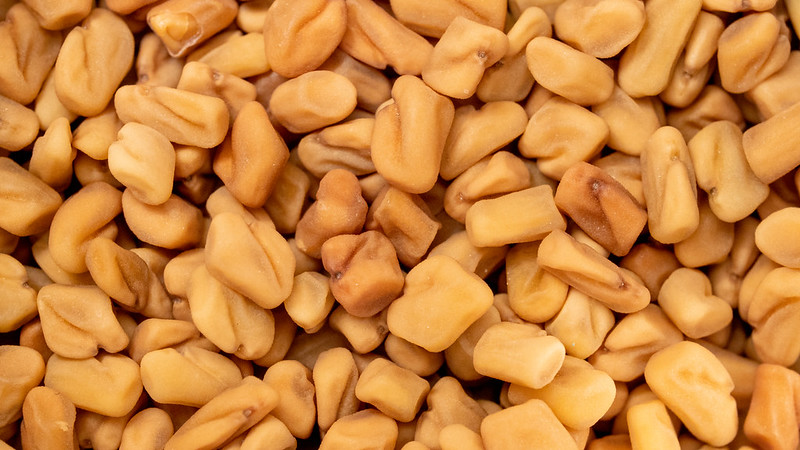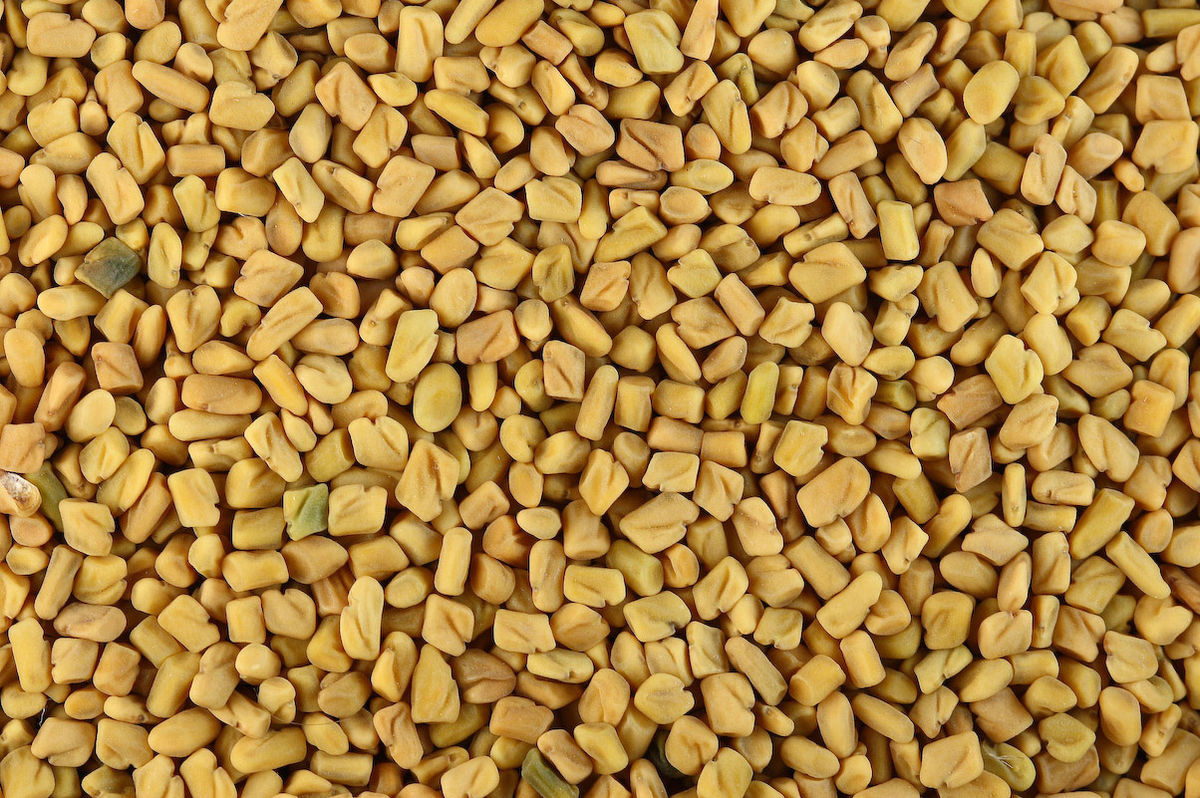
When it comes to enhancing hair health and beauty, nature has given us some exceptional resources. Among them, one stands out in particular — Fenugreek, also known as ‘Methi.’ This common kitchen spice, with its distinctive aroma and flavor, offers a plethora of hair benefits that we will explore in this comprehensive guide.
Whether it’s the fresh green leaves or the golden seeds, every part of fenugreek has potent properties that can work wonders on your hair. Let’s journey through the in-depth benefits of fenugreek leaves and seeds for hair.
Unraveling the Power of Fenugreek Leaves (Methi) for Hair
Methi, or fenugreek leaves, are an ancient remedy used in traditional hair care rituals across cultures. They are a powerhouse of nutrients such as protein, iron, and vitamins, all of which play a significant role in hair health.


Why Methi is a Hair Health Game-changer
Here are some reasons why methi leaves are a popular choice for hair care:
- Protein-Rich: Being high in protein, methi leaves provide the necessary nutrients to the hair follicles, promoting healthy and robust hair growth.
- Hydration: They possess unique moisture-locking properties, which help to hydrate the hair and scalp, thus combating dryness, and leaving your hair smooth and manageable.
- Anti-Dandruff: Their anti-fungal properties help to eradicate dandruff, providing relief from itchy scalp conditions.
Harnessing the Benefits of Methi for Hair Growth
The use of methi for promoting hair growth has been a long-held tradition passed down through generations. The nutrient-rich profile of methi leaves strengthens hair roots, resulting in healthier and faster hair growth.
How to Maximize Methi’s Hair Growth Properties
For a quick and simple hair treatment, create a DIY hair mask using methi leaves:
- Soak a handful of methi leaves in water overnight.
- Grind the leaves into a fine paste the next morning.
- Apply the paste to your hair and scalp, covering every strand.
- Leave it on for 30-45 minutes before rinsing off with a mild shampoo.
This simple hair mask not only promotes hair growth, but also adds a beautiful shine to your hair, combats dandruff, and helps to reduce hair fall.
Discovering the Miracles of Fenugreek Seeds (Methi Dana) for Hair
If you thought that the benefits of fenugreek were limited to its leaves, wait until you discover the magic of its seeds. Fenugreek seeds, or Methi Dana, are filled with essential nutrients such as protein, Vitamin C, iron, potassium, and nicotinic acid, making them incredibly beneficial for hair health.
The Wonders of Fenugreek Seeds for Hair Growth
Just like methi leaves, fenugreek seeds are incredibly effective in promoting hair growth. Here are some reasons why:
- Nutrient Rich: These seeds are a gold mine of essential nutrients for hair health, including vitamin C, iron, and protein.
- Hair Shine: Regular use of fenugreek seeds can give your hair a healthy shine and make it look nourished and lustrous.
- Hair Fall: They help to strengthen the hair shafts, reducing hair breakage and loss.
How to Reap the Benefits of Fenugreek Seeds for Hair Growth
To make the most out of fenugreek seeds, try this simple hair mask:
- Soak two tablespoons of fenugreek seeds in water overnight.
- Grind the softened seeds into a fine paste the next morning.
- Apply the paste to your hair and scalp.
- Leave it on for 30 minutes before washing it off with a mild shampoo.
This mask will help to strengthen your hair, promote hair growth, and add a beautiful shine to your locks.
The Hidden Benefits of Soaked Fenugreek Seeds for Hair
Don’t discard the water used to soak the fenugreek seeds — it’s a nutrient-rich hair tonic! This fenugreek water helps in hair growth and can be used as a final rinse after shampooing your hair.

Must-Try Fenugreek Hair Treatments
Fenugreek (Methi) Hair Mask
Here’s a hair mask recipe you can easily whip up at home:
Ingredients:
- 2 tablespoons Fenugreek seeds
- 1 tablespoon Yogurt
Procedure:
- Soak the fenugreek seeds in water overnight.
- Grind the seeds into a fine paste.
- Mix the yogurt into the paste.
- Apply the mask to your hair and scalp.
- Leave it on for about an hour.
- Rinse it off with a mild shampoo.
This mask deeply conditions your hair, leaving it silky and shiny.
Egg and Fenugreek Hair Mask
The combination of egg and fenugreek can significantly promote hair growth. The egg provides the necessary protein, while fenugreek boosts the blood flow to the hair follicles.
Ingredients:
- 1 Egg
- 2 tablespoons Fenugreek seeds
Procedure:
- Grind soaked fenugreek seeds into a fine paste.
- Beat an egg and mix it with the fenugreek paste.
- Apply this mixture to your hair and scalp.
- Leave it on for about an hour.
- Rinse it off with a mild shampoo.
Frequently Asked Questions
Is Methi Good for Hair?
Absolutely! Both fenugreek leaves and seeds are highly beneficial for hair. They help to promote hair growth, add shine, reduce hair fall, and provide deep conditioning.
How to Use Fenugreek Seeds for Hair Growth?
Fenugreek seeds can be used in a hair mask, as described above, or the water used to soak the seeds can be used as a hair rinse.
What are the Benefits of Fenugreek Water for Hair?
Fenugreek water promotes hair growth, fights dandruff, enhances hair thickness, and adds a shine to the hair.
How to Use Fenugreek Water for Hair?
After shampooing, simply rinse your hair with the fenugreek water. You can rinse it off with plain water after 2-3 minutes or leave it on.
Conclusion
Whether you’re looking to nourish your hair, stimulate hair growth, or add an enviable shine, fenugreek — in both leaf and seed form — is a versatile and potent natural hair care solution. Budget-friendly and easy to use, it’s no wonder that fenugreek has been treasured for centuries as a go-to solution for hair health. Why not give it a try today? Embrace the power of nature and unlock the secret to healthier, shinier hair with fenugreek!
6 Benefits of Fennel Seeds (Saunf), click here
Read 7 Benefits of adding Cumin Seeds to your diet, click here
For 7 Benefits of Mustard Oil, click here
For videos related to Health and Wellness, Subscribe to our YouTube Channel:
Masala Monk – The Gourmet Store
Please do have a look of our wide variety of products prepared using Fenugreek(Methi):
Aam Gunde ka Achar/Marwari Kairi Lehsua Pickle
Adrak ka Achar
Kundru/Tendli Pickle
Bharwa Parantha Masala
Chicken Pickle – 100% Himalayan
Kadaknath Pickle (Wild Black Chicken Pickle)












